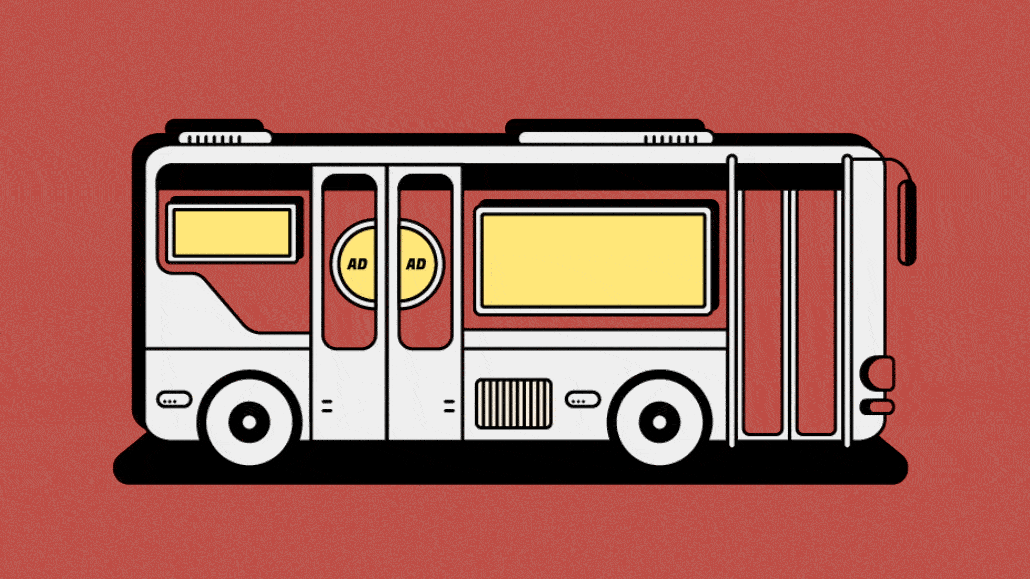Secure your place at the Digiday Media Buying Summit in Nashville, March 2-4
Why gut health soda brand Poppi aims to ‘saturate’ New York City with OOH ads as it targets Gen Z, millennials

Poppi, a gut health beverage brand created in 2020, has primarily used social media platforms like TikTok and Instagram, platforms where conversations about gut health have been popular in recent years, to get the word out. This month, the brand is shifting gears from digital to field marketing for the first time with an out-of-home advertising campaign.
“Everyone has been locked down for the last few years, and we’ve been desperate to get out and really show who and what Poppi is,” said Allison Ellsworth, founder of Poppi, adding that the brand’s campaign features out-of-home ads while also using social media influencers to promote the product.
Aside from OOH ads in New York, Poppi is also doing 270 demos across the city with guerrilla sampling.
“It’s a big push to just really get our name out there and to just saturate the city of New York,” said Ellsworth, commenting on the fact that they could not do this prior to this year due to the city shutting down from 2020-2021. As summer is a time when people try to stay hydrated despite the heat, the brand’s promotional campaign serves to bring awareness to the brand among its millennial and Gen Z target audience.
Poppi spent a little over $1 million for this campaign, according to Ellsworth, and the budget was split between OOH, print ads, influencer marketing, Amazon, and social media marketing through TikTok. Starting in July, it will run for six weeks. Ellsworth did not give exact figures on which channel received how much. However, Ellsworth estimated that 80% of the budget went toward influencer marketing.
The brand tapped influencers such as Larray, a YouTube personality, Angel Merino, a celebrity make-up artist and beauty influencer, Brigette Pheloung, a TikTok star, and Makayla London, a fashion model and TikTok star to help promote the campaign. Poppi chose those influencers with factors such as follower size, their impact with their millennial and Gen Z audience and authenticity.
“You want to have diversity, you want to have inclusivity, you want to have people of color, people [who are] plus size, LGBTQ, straight red hair, right? Like you want to also be super-inclusive within these campaigns so that it’s authentic and real,” said Ellsworth of the brand’s influencer strategy.
“Carefully choosing who to work with in a creator partnership is key for brands today,” noted Magda Houalla, senior director of the Influencer marketing platform for 800+ Shopify merchants and e-commerce brands, Aspire.
“Brand and creator partnerships today are so much more than a handful of posts on social media; we’re seeing creators have a direct impact on product development, attend events alongside industry experts, and of course, create content that fuels every marketing channel for the brand,” said Houalla. “Giving each creator the opportunity to add their own personal touch to engage audiences [will help] in ways that will resonate.”
Sol Betesh, COO & co-founder, Fallen Media, the creator-driven content studio building next-gen media brands commented further about Poppi’s strategy for this campaign: “Brands are starting to recognize the ultimate value in two trends: great content and talented creators. When you combine the two, you’re set up for real valuable engagement with your audience.”
Poppi is not the only brand that is branching out from digital ads to more traditional mediums now. As previously reported by Digiday, Uproad is also doing these advertising campaigns. The two startups launched during the pandemic in 2020, and both of them aim to take advantage of the fact that people are now out and about more than during the early days of the pandemic.
An omnichannel approach in the current market conditions is “no longer a luxury, it’s a requirement,” said Matt Davis, co-founder and CEO of the vegan and vegetarian meal delivery service Mosaic Foods, of Poppi’s overall strategy.
More in Marketing

Future of Marketing Briefing: AI’s branding problem is why marketers keep it off the label
The reputational downside is clearer than the branding upside, which makes discretion the safer strategy.

While holdcos build ‘death stars of content,’ indie creative agencies take alternative routes
Indie agencies and the holding company sector were once bound together. The Super Bowl and WPP’s latest remodeling plans show they’re heading in different directions.

How Boll & Branch leverages AI for operational and creative tasks
Boll & Branch first and foremost uses AI to manage workflows across teams.








